Simple Steps to Build Your Author Platform
 You’ve worked hard on writing your book, creating the synopsis, have signed with an agent, and together are pitching your book with the hope of a publisher picking it up. You believe that a publisher will judge your book by the quality of your writing along with your topic to decide whether they will publish your book (or not). Wrong! Guess again. A publisher will look at your ‘platform’.
You’ve worked hard on writing your book, creating the synopsis, have signed with an agent, and together are pitching your book with the hope of a publisher picking it up. You believe that a publisher will judge your book by the quality of your writing along with your topic to decide whether they will publish your book (or not). Wrong! Guess again. A publisher will look at your ‘platform’.
What is that?
Your author platform is your reach – which really means, “How many books can this person sell?”
Prior to social media that was often determined based on whether you were a professional speaker who had ongoing opportunities to get in front of potential buyers. Or it was measured by the size of your email list. Now it’s still includes these first two but added into the mix are:
How many Twitter followers do you have?
How many Facebook friends/fans do you have?
How many followers do you have on Instagram and Pinterest?
How many connections do you have on LinkedIn?
How many people follow your blog?
(Yes, you need to have a website and interact with your readers.)
Don’t care about a publisher because you are going to self-publish? All the more reason you need an author platform if you want to sell that book of yours to readers.
Your book’s message is important, don’t get me wrong. However, as an author your goal is to reach as many readers in your niche as possible to increase book sales. The prospect of marketing may seem a bit daunting, but in today’s social media world you can take full advantage of getting the word out both offline and online with a few simple steps to build our author platform.
Let me tell you a real story about an author I have worked with…
When this author first contacted me about potentially working together, he had a brand new website, new social media setups that were a mixture of his self-published book, his business and his name without any following and two goals: 1) Sell enough books to be picked up by a major publisher; and 2) create enough interest to speak at large conferences in his genre.
After 6 months of social media promotion and management along with ongoing SEO work with his website, his book was picked up by Beyond Words, a Simon and Schuster imprint along with an option on his second book.
With the release of his second book he decided to shop other publishers before proceeding with his existing one. To his amazement, major publishers were answering his emails and phone calls directly, without an agent.
He is convinced that the number of books sold along with his excellent ‘author platform’ is the reason why.
The best time to start building your author platform is well before your book is published.
Have you made the necessary preparations for marketing your book?
Many authors miss this step when it comes to book publishing. Whether it is digital or paperback, it nearly impossible to ignore the reality that word of mouth now exists on social media, which ties directly into your other marketing channels.
Let’s a take a look at some areas to focus on first, which will help you create a buzz about your book much faster:
Create a dedicated website for your author name or book
If you plan on writing a series or multiple titles, then you might want to consider choosing a domain in your name or pen name. It is easy to research what is available on sites like GoDaddy.com. If your focus will be on one book or one type of book, then a domain containing the book title is another way to go. A third option is to choose a keyword that relates to your topic for your domain name. It is well worth purchasing a domain rather than creating a website on a free blogging service like Blogger or WordPress.com. Not only does having your own domain show you are serious – this isn’t just a hobby – search engines will find you by your name, and you will be consistently building your platform and brand. Using a free service and then at a later date moving everything, is possible but not preferable. Here’s a great example from author, Marsha Collier, who has written 48 books in the areas of social media, eBay, and online customer service:
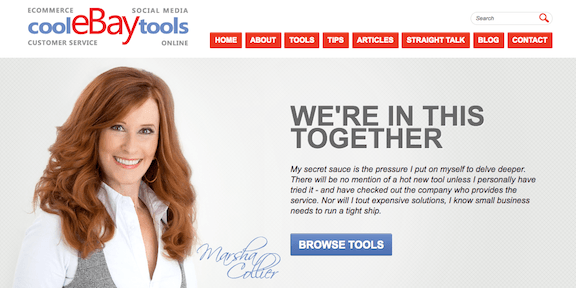
Make sure you have a blog as part of your website
As an author it is important to post content on a regular basis, even if it is just one or two times a month. The articles that you write will publish to a news or RSS feed, which is ultimately found in search engines. If you need the help of a developer for this then you can find plenty of freelancers. Be prepared to give very clear instructions about your needs because you will be directing the process. If communicating with a developer directly is a challenge, or you need additional assistance in deciding your needs, we can help you as well. Take a look at a few of our author websites. After you get into a pattern of writing blog posts, remember that if you can be posting more often, even daily, the more credibility and activity you create to your website.
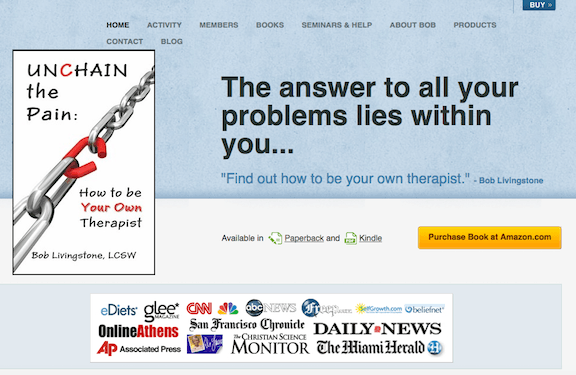
Get social with the major networks
Do you already have a social media profile set up on sites like Facebook, Twitter and YouTube? Now is the time to re-evaluate the names and consider whether they are consistent with the domain name on your website. You can change your @handle on Twitter if needed to create consistency. With Facebook we recommend that you create an author Page and not use your personal profile. The key is to have all of your social networks pointing to the same brand: the author, the book, or the topic. The setup of these networks is free and easy to do. Be sure to use professional images, especially for your profile photo.

Create frequent social media updates
As an author you will want to update as often as possible on your various social networks. Invite those in your inner circle whom you feel will help build your brand community and are truly interested in your work. Engage in other niches similar to yours with helpful feedback. Follow other social media users that would tie directly into your area of expertise. Facebook and Twitter are the top two main accounts you should set up. After that YouTube is a great platform to host your book trailers, interviews, events, etc. Don’t forget about connecting with other authors and people who are interested in your book topic on LinkedIn. Other social media sites like Pinterest and Instagram are also growing in popularity and can also help you build a stronger online presence and author platform.

Join the discussion
Offer your feedback on blogs that share similar interests to you without directly selling in your comments. You can also join author networks like Goodreads where you can showcase your book title(s) and participate in groups. Owned by Amazon, it’s the online form of networking for anyone who has published a book or follows their favorite writers. Likewise on Facebook you’ll want to interact with communities and groups in your genre. For Twitter create a ‘List’ of those you enjoy following and interacting with.
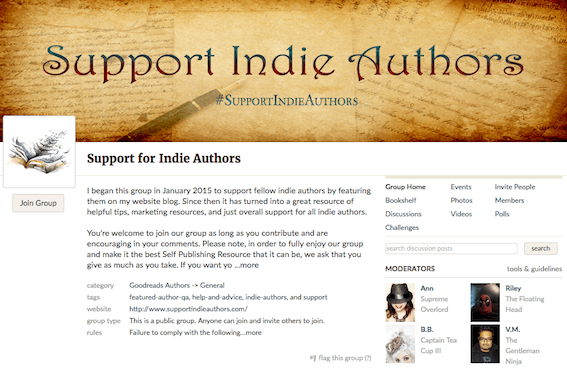
Create a contact opt-in and Newsletter for your website
Once you have established your social media networks and created your website you can grow your list of followers and keep them up to date with services like Constant Contact, Mail Chimp, Aweber, etc. This is a great way to announce book signing events, news, and upcoming book releases to your audience. This is your list, and not only will publishers want to know how many people are on it, the more people you can send information out to, the more books you will sell.
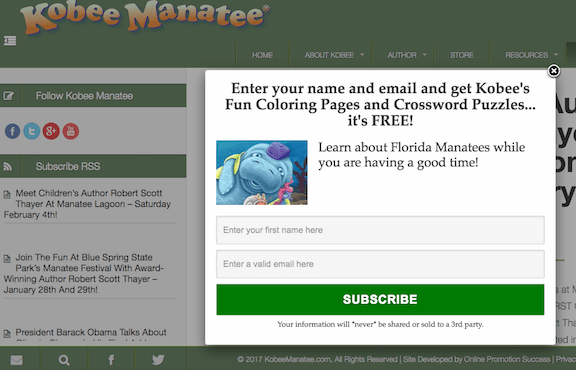
Cross promote online with offline marketing
Are you speaking at an event or signing books at a local bookstore? With fans and followers, you announce these events as well as on your website.
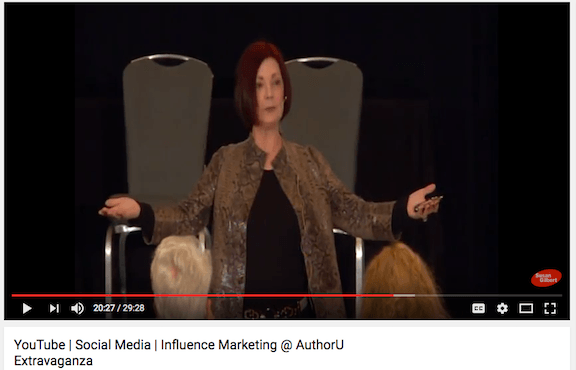
Create a giveaway
One of the best ways to build an audience fast is to host a giveaway of your book or even a chapter. You can do through through Facebook with various apps like Rafflecopter and also on Goodreads. Use your blog to make the announcement to your readers and also create a giveaway that will encourage new fans and followers.

There are several tools available for authors, which make creating a dedicated website and managing social media and blogging a lot easier.
Websites: WordPress is a free platform that can be installed on most paid hosting accounts. We love Hostgator. There are thousands of free templates to choose from, which are easy to customize as well as low cost templates like Woo Themes or Elegant Themes. Wix and Weebly are both newer website builders that have also become popular, which offer hundred of templates to choose from and a shared hosting platform.
Social Media: Hootsuite, Buffer, Post Planner and Sprout Social are the top three social media management systems where you can schedule tweets and posts in advance. Hootsuite in particular will allow you to upload bulk posts in a .csv file format. These services are free with paid options.
Once you have made the decision as an author that your book is ready for publishing, it is a good idea to have your marketing prepared and ready to go in order to build your author platform if you haven’t already started doing so. If you decide to publish on sites like Amazon and Barnes and Noble, be sure to include a completed author profile with a link to your website, which should prominently display icons and links to your social networks.


0 Comments